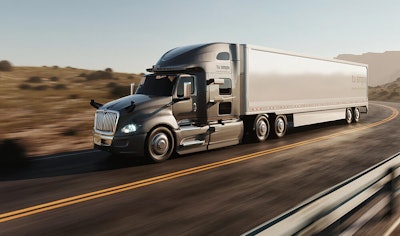
Autonomous truck developer TuSimple once viewed as a leader in the expanding self-driving industry announced today that it will be laying off 25% of its staff as part of a restructuring plan following a series of setbacks that includes a truck crash and a federal investigation.
From its headquarters in San Diego, TuSimple announced that roughly 350 employees would lose their jobs.
TuSimple President and CEO Cheng Lu, who replaced fired CEO Xiaodi Hou last month, laid the blame for the layoffs on what he called a ‘difficult’ economy.
"I returned to TuSimple as CEO to help address a number of challenges and set the Company up for long-term success,” Lu said. “This required evaluating our entire workforce and making tough decisions. It's no secret that the current economic environment is difficult. We must be prudent with our capital and operate as efficiently as possible. While I deeply regret the impact this has on those affected, I believe it is a necessary step as TuSimple continues down our path to commercialization. This is part of our overall strategy to prioritize investments that bring the most value to shareholders, and position TuSimple as a customer-focused, product-driven organization."
The layoff leaves 80% percent of TuSimple’s remaining staff in research and development which includes engineers critical to hardware and software resilience, reliability, safety and information security.
TuSimple plans to actively work with key shipping partners to operationalize its autonomous technology, and in an effort to help ensure capital efficiency, the company also plans to scale back freight expansion, including unprofitable freight lanes and respective trucking operations.
Trucking operations along those lanes utilize previous generation autonomous software that provides limited value to the Company's on-going technology development. The majority of the restructuring is in the Company's U.S. operations as the Company continues its plan to explore strategic alternatives for its Asia business, including a divestiture.
The Wall Street Journal reported that the company’s test-driving program in Tuscon, Ariz., “will be eliminated.” TuSimple's stock value has dropped 77% over the past six months.
After returning to lead TuSimple last month, Lu made the commitment to set the company on the path towards stability and long-term success.
Ongoing challenges have continued to hamper TuSimple’s place among a growing market of autonomous truck players which seek to improve delivery times and safety over trucks driven by people subjected to hours-of-service regulations.
In April, an autonomous TuSimple truck crashed into a concrete barrier on Interstate 10 in Tuscon. There were no injuries in the wreck which the company blamed on human error.
Nonetheless, TuSimple pushed ahead in an effort to maintain its leadership in the Class 8 autonomous market and in June had announced a hiring campaign on a social media.
However, in October then-TuSimple CEO Xiaodi Hou was fired after a WSJ report alleged TuSimple was being investigated by the FBI, the Securities and Exchange Commission and the Commission on Foreign Investment about the company’s ties with Hydron, an autonomous startup founded by TuSimple co-founder Mo Chen earlier this year.
In the past 30 days, TuSimple has named three independent directors to the board, reconstituted its board committees, including an independent audit committee in compliance with Nasdaq requirements, and stabilized the management team, including naming its interim CFO, Eric Tapia, as permanent CFO. In addition, Mike Mosier, one of the new independent board members, was named as TuSimple's Security Director – a position which required review and a notice of non-objection from the Committee on Foreign Investment in the United States.
TuSimple did not respond to an interview request.









